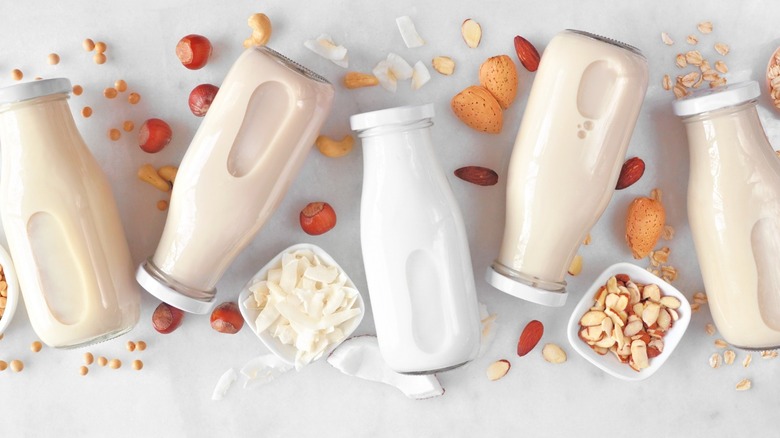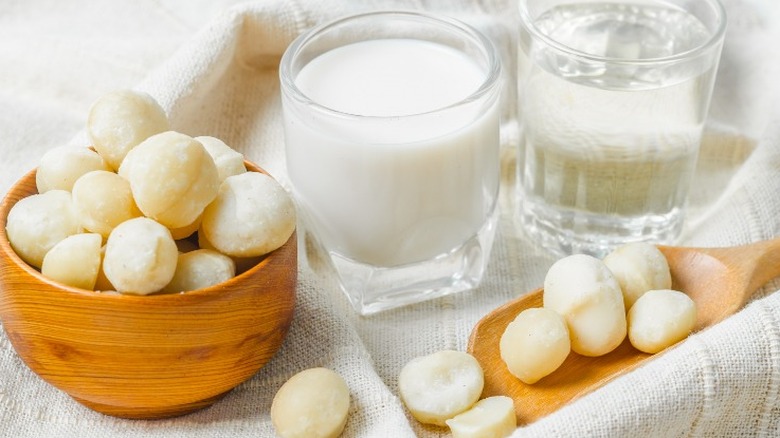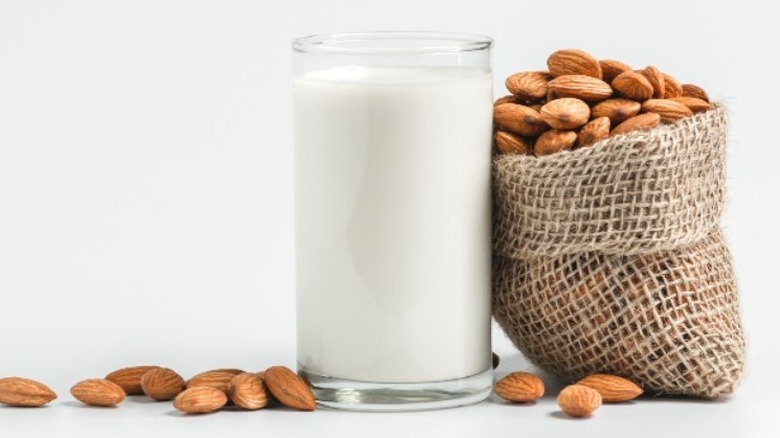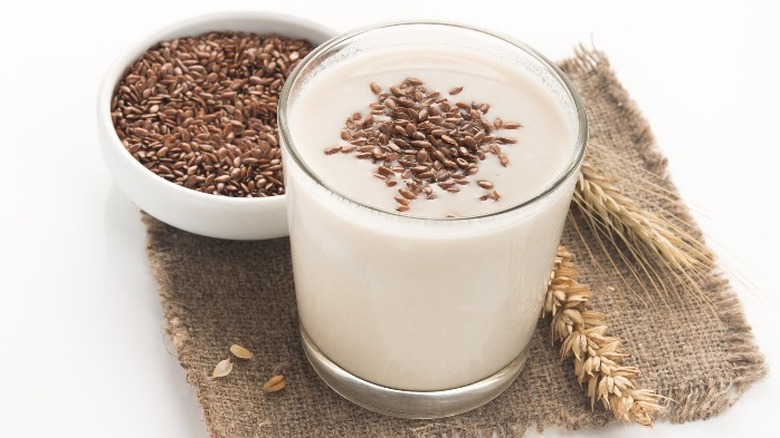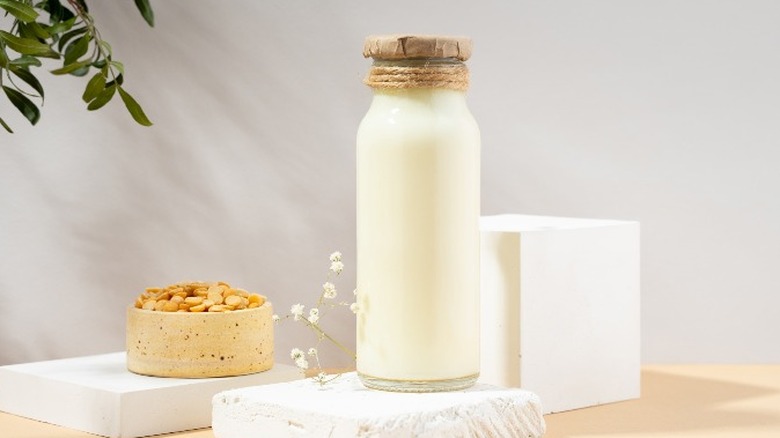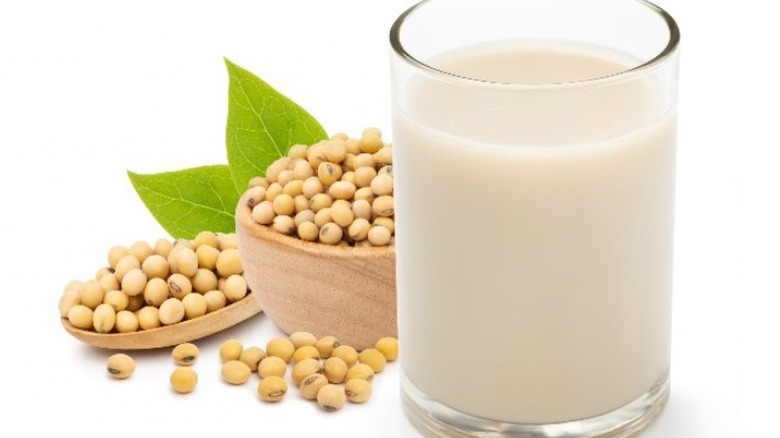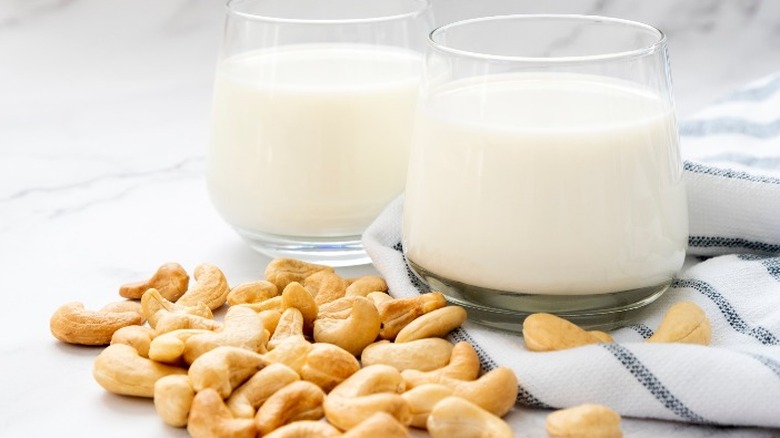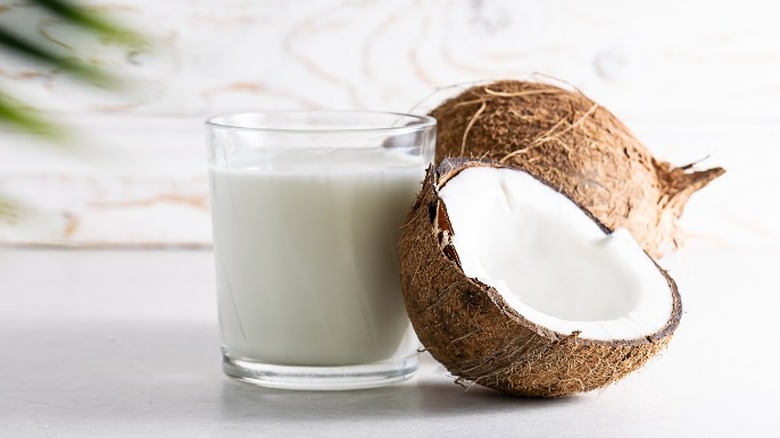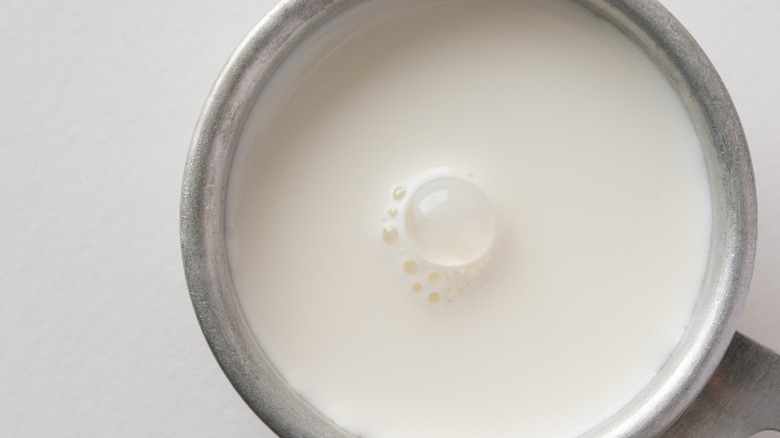10 Best Keto-Friendly Milk Alternatives
While perusing your local supermarket's vast selection of milk types, you might notice an eyebrow uncontrollably furrow in awe. Who ever thought you could make milk from ingredients like nuts, seeds, legumes, and oats? With so many varieties available, finding a low-carb, keto-friendly option is simpler than ever.
On the ketogenic (or keto) diet, you are required to eat meals and snacks that are high in fat and low in carbohydrates with moderate protein intake. You want to restrict your net carbs to about 25-30 grams daily to ensure the body stays in ketosis, the metabolic state where your body burns fat for energy, per Healthline.
It can be overwhelming to find low-carb beverages at first but keeping an eye out for net carbs is a great way to keep you on track. When looking at the nutritional label, find your net carbs by calculating the total carbs minus the fiber — that's it! For a keto-friendly milk option, anything under 5 grams of net carbohydrates per serving is a solid option, but the lower the net carbs, the better. That means you'll want to avoid milk made with carb-based ingredients like rice and oats (via KetoConnect). Similarly, cow's milk and goat's milk carry too many carbs, so be sure to skip those options, too. Instead, try one of these plant-based milk options, which check all the macro counts you need.
Macadamia nut milk
Macadamia nut milk is a top keto-friendly kind of milk, thanks to the high fat and low carb content in each carton. A rich creaminess offers a comparable mouthfeel to cow's milk, and it's simply delicious. If you can find a carton of unsweetened macadamia nut milk, grab it.
A carton of Milkadamia unsweetened macadamia nut milk contains less than one gram of net carbs and 1 gram of protein per cup (via USDA). But aside from its low-carb benefits, macadamia nut milk has something that no other nut milk offers — a generous amount of fat. One cup alone has 3.5 grams of total fat, according to Milkadamia. Any ingredient that offers high fat and low carb is your golden ticket on the keto diet.
In fact, this food is so high in fat (and calories) that some say you should think twice before eating macadamia nuts. We believe it's likely because they are so delicious, and overeating is far too easy. One cup of dry roasted and salted macadamia nuts contains a whopping 945 calories, so keep that in mind when you grab a handful (via USDA).
While we love the high-fat and low-carb content in this type of nut milk, there is a slight disadvantage to adding it to your grocery list. Macadamia nut milk is not as widely available as other types of milk, so you might have to run to a supermarket specializing in natural and organic foods to find it.
Almond milk
Almond milk, on the other hand, is popular and easy to find, plus it's not that expensive. Because it's so widely available in grocery stores and coffee shops, you'll have no problem finding it for your dietary needs. An 8-ounce serving of Blue Diamond unsweetened almond milk has 30 calories and under 1 gram of net carbs, making it an excellent keto milk option. There is so much to know about almond milk besides its keto benefits.
The nutty flavor substitutes well in most recipes, whether adding a dash for your morning brew or making a low-carb smoothie to start your day right. When shopping for almond milk, check labels and steer clear of varieties with added sugars. Even those naturally sweetened with honey may have too much sugar for a keto diet, so always check that the carton is labeled "unsweetened."
If you're up for the challenge, you can make a batch at home — it's easier than you think. By soaking raw almonds and then blending and straining, you'll have a refreshing low-carb glass of milk made fresh. From there, you can flavor it with vanilla bean or a pinch of ground cinnamon, then name it your signature drink, a la keto! Between your homemade version or the dozens of shelf-stable and refrigerated unsweetened almond milk, you should have no trouble finding one you love.
Unsweetened chocolate almond milk
Who doesn't love a cold glass of chocolate milk? We know it doesn't sound like a keto-friendly option, but it actually can be. Also, we know we just talked your ear off about regular unsweetened almond milk, but the delicious chocolate version exists, and we think all keto dieters should know about it.
Blue Diamond offers unsweetened chocolate almond milk that is low in carbs but offers the rich chocolatey taste that many crave while on the keto diet. 8 ounces of chocolate almond milk contains about 1 gram of net carbs and 3 grams of total fat, so you can have at least one or two servings per day without risking going over your carb count.
The chocolate milk alone offers a nice natural chocolatey flavor, but it is certainly missing that oh-so-sweet touch that chocolate milk usually boasts. There are a few ways to safely sweeten it without disrupting your ketosis. Some of the best sweeteners include stevia and monk fruit, which are natural sweeteners, and sucralose, which is an artificial sweetener. You can also try erythritol or xylitol, which are types of sugar alcohol (via Healthline). Each is great to use in moderation to help balance out flavor while managing a low-carb diet like the ketogenic diet.
Flaxseed milk
Flaxseed milk, often referred to as flax milk, is a low-calorie non-dairy milk made with, you guessed it, flaxseeds. The tiny, shiny seeds offer all sorts of nutritious value, including omega-3 fatty acids, protein, and fiber (via Healthline). So, enjoying a cold glass or adding a dash to your coffee is a perfect way to kick things off right.
Per the USDA, a standard cup of flaxseed milk contains 1 gram of carbs, making it an excellent keto-friendly alternative to typically high-carb dairy milk. Flax milk might not be as easy to find as almond milk, but if you feel daring, grab your high-speed blender and follow a recipe to make it from scratch. The milk is made similarly to other non-dairy milk — combining flaxseeds and water, blending it all together before straining it. Just be sure to avoid adding any sweet ingredients like dates, maple syrup, or honey.
Aside from grinding flaxseeds up and using them to make milk, flaxseeds make a healthy addition to several snacks and meals. Next time you find yourself in the baking mood, consider adding them to your quick bread, gluten-free flax muffin recipe, or granola bars.
Pea milk
While most plant-based alternatives are made by blending water with nuts or seeds, believe it or not, you can even make milk from a humble yellow pea! Pea milk might not sound that appetizing to you; peas aren't everyone's favorite vegetable, but they are an excellent source of plant-based protein, an important part of the keto diet.
In fact, 8 ounces of unsweetened pea milk offers an astounding 8 grams of protein, and only 2 grams of net carbs, according to USDA. Anyone trying keto with nut or soy allergies will love pea milk as a safe and healthy option.
As Mashed writes, pea milk brands like Ripple possess a thick consistency that is similar to cream, so drinking it straight up might not be desirable. However, the thickness will lend well to a keto-friendly smoothie, buttery cheese sauce, or even a homemade coffee creamer. The possibilities are endless here; after all, you are the chef in your kitchen.
For a nut-free version of keto-friendly chocolate milk, look for Hershey's sugar-free chocolate syrup, which contains 3 net carbs in a 1-tablespoon serving (via Hershey's). A bit of that swirled into a glass of cold pea milk and sweetened with keto-friendly sweetener will make for a rich glass of keto chocolate milk that can be enjoyed occasionally.
Soy milk
With so many keto-friendly milk alternatives available, finding the most nutritious version can be challenging. The source of the milk, be it nuts or legumes, is what constitutes the milk as healthy or not. Additives like sugar make a huge difference too. When comparing several plant-based kinds of milk, the most nutritious non-dairy option might surprise you.
Soy milk made its way to the top as a vegan option because of its optimal protein content and low calories when stacked against cow's milk. Plus, it's an excellent option for anyone sensitive to lactose. It's also important to note that soy milk is a bit controversial in the food world today. While many love it for being low in fat with zero traces of cholesterol, the choice of milk is frowned upon by some people, too. One thing to know about soy milk is that because most ingredients are shipped, the final product travels far to reach consumers, making it less than environmentally friendly. So, soy milk might not be your favorite option if you have a big heart for our planet.
As far as keto-friendliness goes, consider soy milk a reliable choice. If you look at a carton of Silk unsweetened soy milk, you'll notice an 8-ounce serving contains 1 gram of net carbs (via Silk). Next time you need a tall glass to wash down some tasty keto cookies, consider soy milk.
Cashew milk
The plant-based trend doesn't seem to go anywhere as non-dairy milk continues to rise in popularity. In fact, we here at Tasting Table surveyed people about their favorite plant-based milk, and more than half of people preferred almond and cashew milk. Similar to other nut milk, cashew milk is a great keto-friendly option because it is low in carbs and widely available in most grocery stores.
When selecting yours, be sure to reach for the unsweetened version to keep those carbohydrates on the low end. A single-cup serving contains only 2 grams of net carbs, so having a glass or two won't kick you out of ketosis. Cashew milk has lots of nutritional value besides being keto-friendly, too. It's good for your eyes thanks to the antioxidants and provides optimal skin health since cashews are loaded with copper (per Healthline).
Your next low-carb chowder or cheddar broccoli soup will find the addition of cashew milk to be just right, thanks to the thick consistency in the milk. Otherwise, whip up a creamy and oh-so-cheesy cauliflower mac and cheese with the help of cashew milk while reaping all the health benefits it offers.
Coconut milk
Coconut milk adds a unique depth of flavor to drinks, desserts, and delectable dinners. Whether you like making savory curries, or sweet homemade puddings, coconut milk is something you should always shave in your pantry. Aside from starring as a delicious ingredient for several dishes, coconut milk is relatively safe for the keto diet.
Coconut milk can be consumed while on the keto diet, but it's a little higher in net carbs than other types on this list. Some brands, like Vita Coco, carry 5 grams of net carbs in a 1-cup serving, giving you little wiggle room for other daily ingredients. Other brands like SO Delicious have only 1 gram of net carbs in a standard 8-ounce serving.
If you plan to add coconut milk to your grocery list, keep in mind that there is a difference between coconut milk and coconut cream. For the keto diet, look for cartons of coconut milk labeled "unsweetened." The cartons are diluted with more water to make them more palatable for drinking.
Canned coconut milk has a higher fat content and a more coconut-forward flavor. It boasts a thicker consistency that the carton version making it better for cooking rather than drinking. Then there's coconut cream which is also great for cooking, and cream of coconut, which is loaded with sugar and should be avoided on the keto diet.
Half-and-half
If plant-based milk doesn't cut it for you, there's a reliable dairy option that you ought to try, and chances are, you might already have a carton in your fridge. Half-and-half, a combination of milk and heavy cream contains about 1 gram of net carbs in a 1-ounce serving (via USDA). Besides being low in carbs, half-and-half contains between 10.5 and 18% fat which is excellent for a high-fat diet like keto (via FDA). So aside from adding it to your coffee, you can also dilute it with cold water to create a convenient glass of milk. Although it's a different product than heavy cream, the two products can sometimes be substituted.
One big difference between half-and-half and heavy cream is the viscosity of the two products. Because heavy cream is so thick, using that in place of half-and-half will create ultra-rich results that may or may not be desirable, depending on what you're cooking up. Otherwise, using half-and-half in place of heavy cream is usually pretty harmless. Like all other keto-friendly milk, check the label before purchasing and ensure the brand you choose has no added sugar or sweeteners.
Heavy cream
Heavy cream is not technically a type of milk, but rather the fatty content that is separated and removed from fresh dairy milk. Most brands, like Horizon organic heavy cream, claim to contain approximately one gram of carbohydrates and five grams of total fat per serving (per USDA).
The high-fat, low-carb content makes this ingredient a fantastic addition to several keto recipes. It would be the perfect milk alternative when on the keto diet, but the ultra-creaminess is way too thick and leaves a greasy mouthfeel when consumed on its own. Although we don't recommend drinking heavy cream straight up, if it is combined with water or other nut milk, you've got keto liquid gold.
Aside from combining it with water and fixing yourself a low-carb drink, heavy cream thickens up nicely with the help of a bit of heat, making it a great base ingredient for soups and sauces. We're talking cheese sauces, quick flourless gravies, and potato-free chowders. Otherwise, you'll love how quickly it whips up with the help of a hand blender or whisk. It'll top fancy cocktails and sugar-free puddings when craving something sweet. Add a quick spritz of liquid Splenda or any other keto-friendly sweetener if you're craving a little sweetness.
